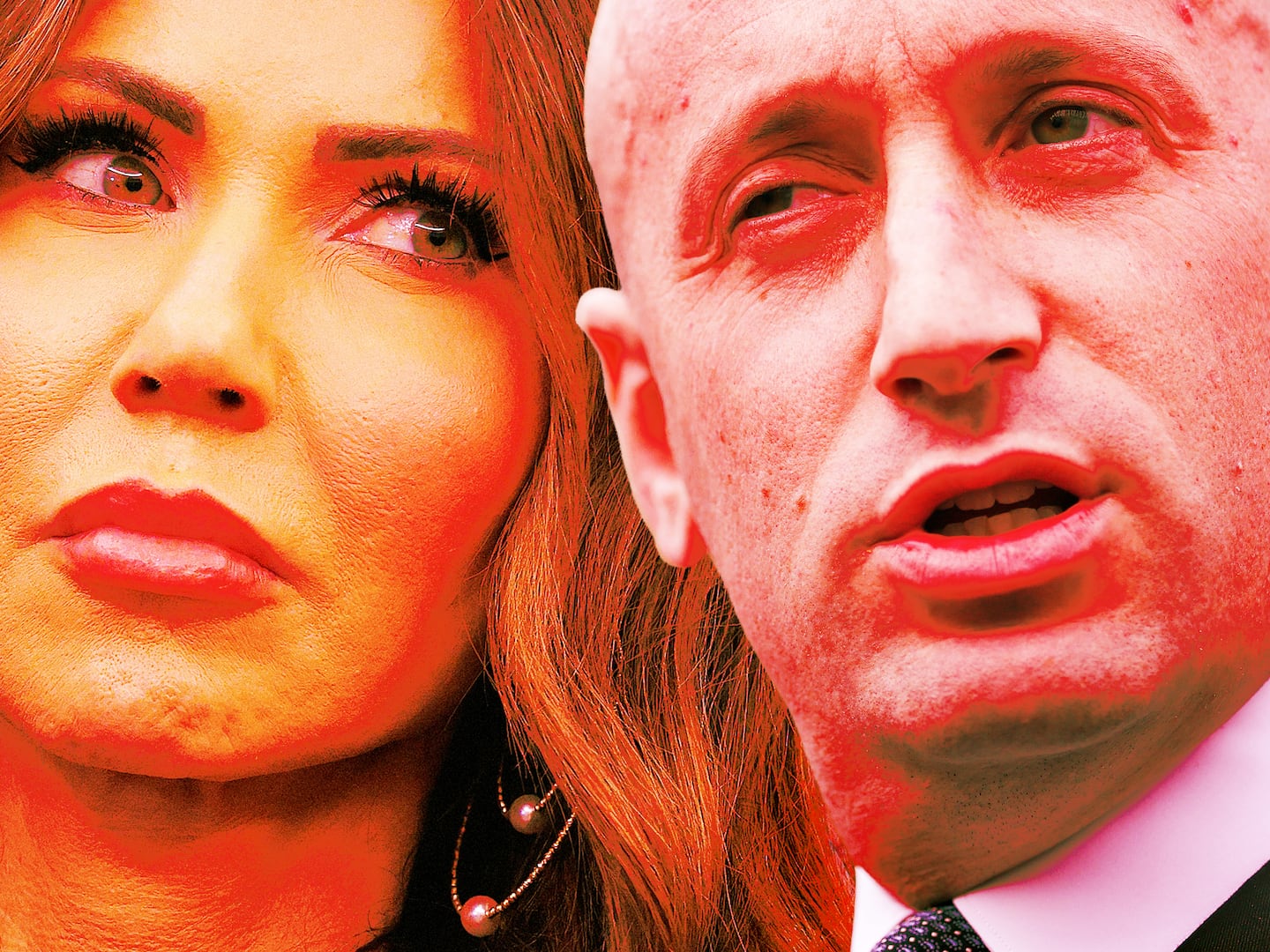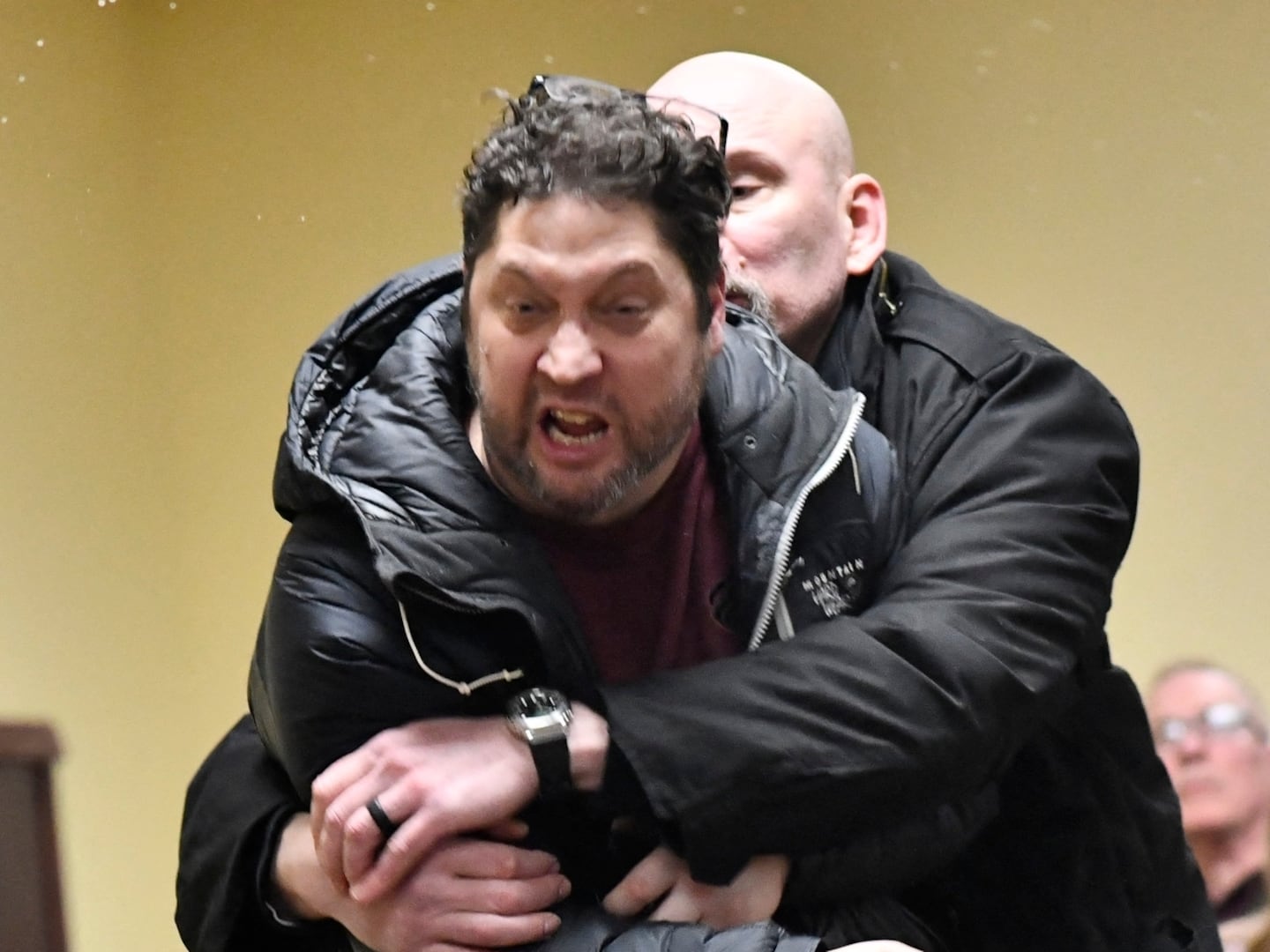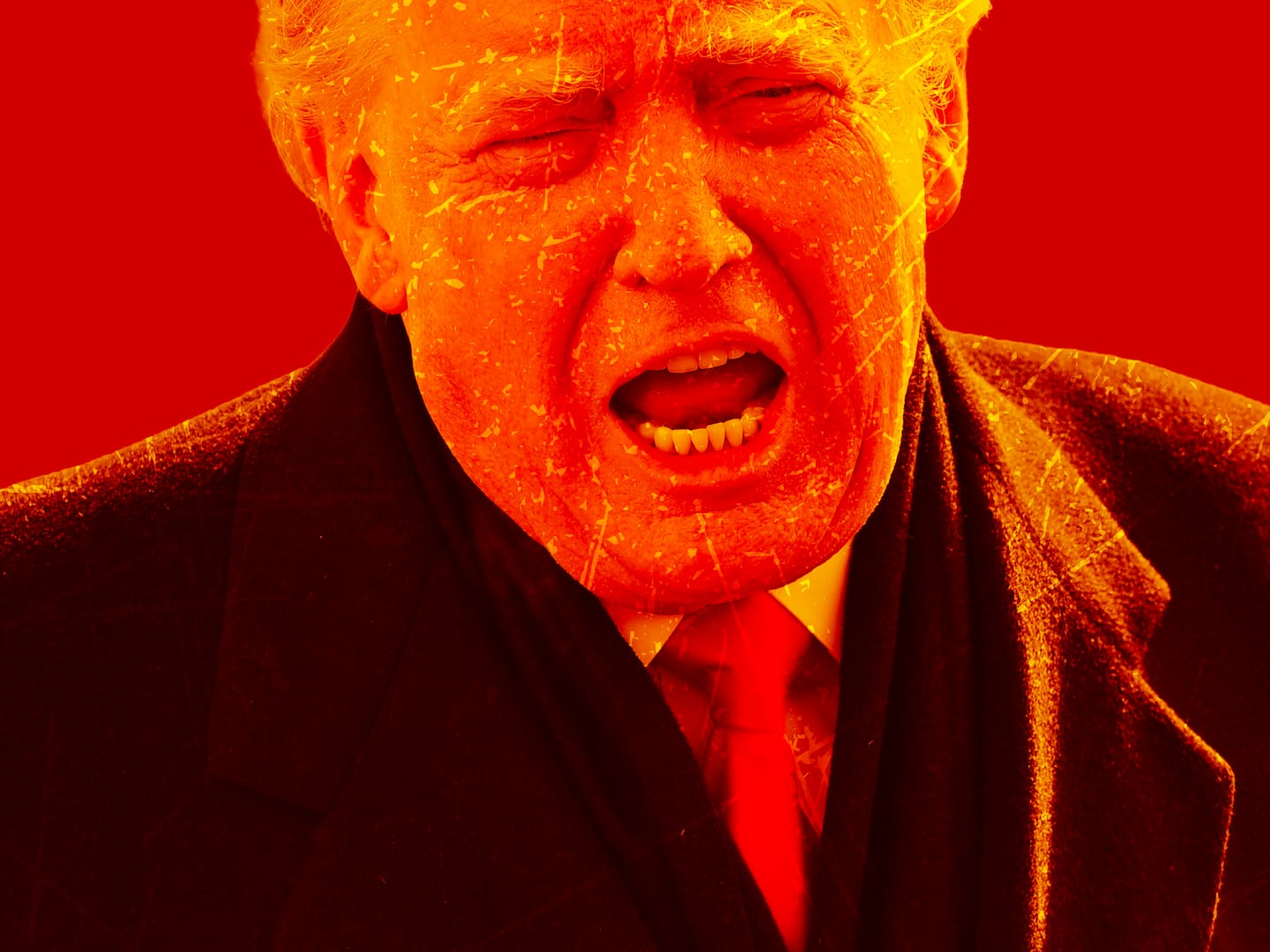
Two weeks ago, AMC’s period drama Mad Men wrapped up its third season with a series of plot twists that have shaken up the series’ narrative foundations. The Daily Beast spoke to Mad Men creator/executive producer Matthew Weiner in an exclusive interview about the season finale.
Now we take you deeper into the world of Mad Men to bring you more details from that interview with Weiner. He discussed the theme of change in Mad Men’s third season; his storytelling use of the Kennedy assassination; the decision made by Betty (January Jones) to leave her husband, Don (Jon Hamm); Joan’s husband Greg (Sam Page) choosing to enlist in the army; that bloodthirsty John Deere, and much more.
“I wanted this season thematically to be about things moving really fast, and a lot of things you take for granted are disappearing.”
The Daily Beast: The Kennedy assassination was a huge part of Season 3. How were you able to mine the historical event to further the characters?
• Read Part I of Weiner’s Postmortem Weiner: I wanted it dramatically to help tell the story of Don and Betty being pushed apart. Betty is very affected by it, Betty’s father died that year, and she is emotionally very raw. And then adding to the fact that she has experienced this revelation with Don, she is using this opportunity to emotionally break down. She didn’t vote for Kennedy and she’s not a big Kennedy lover. [But she gets caught up in] the family tragedy… Jackie and those kids and this young, beautiful man. Before that, he was just a president to these people. All of that personal drama really comes into focus. And then you add [Lee Harvey] Oswald’s murder on top of that, which is a really unsettling sense that no one has control of any of this… [Roger’s daughter Margaret’s] wedding is the moment when she realizes that her marriage and everything she’s clung to doesn’t matter because she doesn’t love him anymore… For Don as well, to get hit hard personally because no matter what was going on in the world, he had a tragedy that was apart from that.
The Daily Beast: I think it worked.
Weiner: I was very scared about doing it. There’s a mythology with this that I already have been pecking away at since I started working on the show. Just reading articles in The New York Times during his presidency where they’re… criticizing him, attacking him... These events have been handed down mostly from the childhood experiences of the Baby Boomers, and I didn’t want to just recreate the childlike experience. I wanted it to feel like I would imagine it would feel to me being 44 years old. Or Don being 37. Margaret (Elizabeth Rice) is young but she is not a child bride. She is 22 years old; that’s about average for getting married then. She’s an adult. You’ve got your life and you’ve got the world. Believe me, what she cared about was not the president; it was that her wedding was ruined. It’s hard to deny that reality.
The Daily Beast: Is the assassination the event that finally pushes Betty away and into the arms of Henry Francis (Christopher Stanley)?
Weiner: Henry was the only one who could make her feel better during the assassination. Part of that is Don’s survival skills; he’s held together psychologically by his ability to believe that everything will be okay… That was not what Betty needed; she needed to be heard. There’s [also] the embarrassment. That’s part of the reason that she kicked him out with [the] Jimmy Barrett [situation]. She never knew for sure that [Don] slept with Bobbie Barrett (Melinda McGraw); it was never documented. It was just Jimmy suggesting it. Her embarrassment over Don’s behavior being public, being the last one to know and everybody being aware of it, that was the thing that really got to her. I think there’s something about finding out that Don had pulled the wool over her eyes, that she was that naïve and trusting, she could not see herself hanging in there for that. And a lot of women could. Marriages were held together with far bigger secrets than this. She could have just embraced him and said, thank you for being so vulnerable, thank you for finally being a human being, but I think that’s not her expectation of a man.
The Daily Beast: The relationship between Don and Peggy (Elisabeth Moss) comes to a head in the season finale. What does his speech to her in that episode represent about where their relationship has gone?
Weiner: I’m very proud of the way Peggy developed over the season…I loved the performances in that scene… Only when you have Babe Ruth and Lou Gehrig in a scene together can you count on [the unspoken] coming across. She might have become even more like Don this season as she went out and tried to have an experience to enlighten herself in the second episode with the Bye, Bye Birdie thing. She’s learning and she’s trying to become more of an adult. I wanted to show that there are consequences for [Don being so hard on Peggy] and that… he could not treat her badly just because she was family. I loved it because he was very honest and intimate in a way he hasn’t ever been with her before, other than when he came to her bedside… I try to maintain on the show the realistic concept of work. It’s why Peggy and Joan (Christina Hendricks) did not become best friends, it’s why Don is not dating Peggy: because they work together… But it was nice to see him come through when it really mattered. Erin Levy wrote the line about relationships that Roger (John Slattery) says, “You don’t value them.” That was really what that scene was about, [him admitting], “I know I come off that way but in my heart, I do.”
The Daily Beast: It was nicely juxtaposed with Don’s flashback, in which his father Archie (Joseph Culp) disbands the cooperative and goes it alone. Don realizes he can’t do that anymore.
Weiner: You can’t do it alone. He said it during the season but he didn’t really mean it. In his heart, he thinks he does do it alone. That’s definitely what the Archie thing was there for. For this man, his pride interfered with his judgment.
The Daily Beast: For many viewers, the John Deere lawnmower scene, where Guy McKendrick's foot got shredded by the errant mower (which spurted blood over the Sterling Cooper employees), earlier in the season was very surprising. Where did the idea for “Guy Walks into an Advertising Agency” come from?
Weiner: I hoped it would have an impact on the audience. That episode in particular had a very unusual structure, which was very hard to get right… I really wanted to do a story about expectation [and it’s summed up in] Sally’s line, which my wife gave me (“I’m afraid of what will happen when I turn off the lights”). For Joan and Don and Guy and Sally, it was about that. The lawnmower… was a way to pull the plug on the expectations and turn everything back to normal. I loved it because it was so funny and ironic and appropriate for a bunch of drunk people in an ad agency to have an accident like that. But it really undid everything and that was what was so shocking about it.
The Daily Beast: Guy gruesomely loses his foot and then everything gets reset. Why use the lawnmower to accomplish that?
Weiner: There was a lot of focus on rural America at that time. It probably climaxes the next year when The Beverly Hillbillies comes on the air but Hootenanny and Hee Haw… that whole thing was a big part of commercial television for sure. John Deere had an ad that was like Green Acres, a city slicker on his new sit-down tractor. I loved the idea of telling a story about the fact the people who were from the country have perspective and respect for this machinery and the city slickers get drunk and then it’s just some stupid lawnmower and that they were going to come face to face with the fact that they had contempt for the country. I don’t know if any of that comes across but I tried to thematically and dramatically express that in the way that the British treat the Americans, which is basically that they’re a bunch of bumpkins, but at the same time they’re using their talents because they obviously knew how to do it better than them…
The Daily Beast: Was it always the intention that Joan’s husband, Greg (Sam Page), would eventually enlist in the army?
Weiner: I wanted to tell a story about Greg not being as advertised and not being as good a surgeon as he had to be to fulfill Joan’s fantasy of her husband.... That was not what she wanted to marry and that’s not what she left her job for and that was not the life that she was hoping to have. Him joining the army to get out of it was actually something that came out of the writers room… It was just the perfect solution because he had to solve his problem with her after she had her outburst and it was the perfect thing for him to do. Despite what people are hypothesizing on the Internet, the army was less stringent about who they let in to be surgeons. They needed a lot of surgeons and they were about to need even more surgeons. It was a great guaranteed living and good standard of life and an opportunity for him to always do what he wanted. It was the perfect solution. What will happen to him and what will happen to them, who knows?
The Daily Beast: Is it true that you were approached by the Hilton chain to use Conrad Hilton as product placement on the show?
Weiner: The Hilton people approached me and mentioned him and gave me his book. I didn’t know that it would become product placement because there never was any deal… [Hilton] was a very open-minded, forward-thinking person… Over the course of the season, he allowed me to tell various aspects of Don’s life; it would never have been as deep or come off as well if [the casting directors] had not brought me Chelcie Ross. All of the sudden, I thought that this is way more than a stunt, this is a three-dimensional person who I want to watch, and he and Don had a lot of chemistry. I directed the last episode and Erin [Levy] wrote a lot of that scene with the two of them. It was hard for me--because I always identify with both characters when I am writing a scene--to even understand on some level that Don was so angry with Conrad Hilton for betraying him, but Conrad Hilton was doing him a huge favor and was stunned that Don couldn’t get over taking it personally. He functioned as a father in the sense that he was teaching him about the ways of the world. Yeah, he’s capricious and unreasonable and it’s hard for us to understand that he could [reject that ad campaign]. Why does it get rejected? Because [Don] didn’t listen to Connie. That’s an amazing thing. That was a great story.
The Daily Beast: What overall theme did you set out to explore throughout the third season?
Weiner: What I was trying to show was how people respond to change… The reason why I call that [penultimate] episode “The Grown-Ups,” is because it’s about who is in charge, who is behaving responsibly, who is capable of dealing with the real depth of change. I wanted this season thematically to be about things moving really fast, and a lot of things you take for granted are disappearing. But are you going to freak out and become conservative and reactionary and angry and bitter? Or are you going to be excited like Don and say, here’s something new? Most of us are in between and a lot of things we lose, we mourn.
The Daily Beast: Most viewers, and I include myself, thought it was an incredible season and a pitch-perfect finale.
Weiner: Everybody [on the show] works really hard and, for me, it was wonderful. I wanted [Don] to be liberated at the end and we had to go to a very dark place to get that feeling. If I had just done that episode as the first episode of the season, you wouldn’t have felt anything and that journey is what I am proud of. Starting off with [the season premiere] and working our way through the expectation of that baby coming and the disappointment that went with that. The two of them slowly straying from each other. Don having to commit to that contract and finally almost subconsciously revealing himself to Betty. Then there they are in this moment of honesty, and the assassination happens, and you are where you are. That was the goal of the season, and I am very proud that, with the help of about 300 people, we were able to pull that off.
Jace Lacob is the writer/editor of Televisionary, a website devoted to television news, criticism, and interviews. Jace resides in Los Angeles. He is a contributor to several entertainment Web sites and can be found on Twitter and Facebook.






